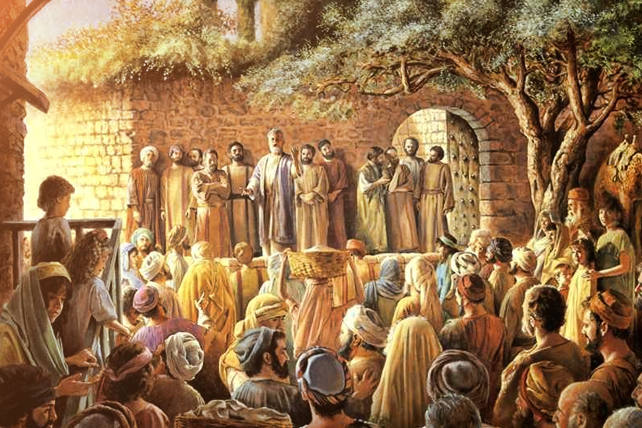
Stephen
Terry, Director

Life
in the Early Church
Commentary
for the July 21, 2018 Sabbath School Lesson
 “Every
day they continued to meet together in the temple courts. They broke bread in
their homes and ate together with glad and sincere hearts, praising God and
enjoying the favor of all the people. And the Lord added to their number daily
those who were being saved.” Acts 2:46-47, NIV
“Every
day they continued to meet together in the temple courts. They broke bread in
their homes and ate together with glad and sincere hearts, praising God and
enjoying the favor of all the people. And the Lord added to their number daily
those who were being saved.” Acts 2:46-47, NIV
When the message of salvation comes to us, it thrills
our hearts. We find such joy in the presence of the Holy Spirit that we eagerly
tell everyone about our experience and encourage them to come to Jesus. I first
experienced this as a teenager in high school. I told many others about Jesus
and the Bible. Sadly this cost me one of my closest friends who was at first
interested, perhaps drawn by my excitement. But when pressure mounted from
family, he withdrew, and we no longer walked together. My continued attempts to
revive our friendship were rebuffed by his family and I was asked not to come
around anymore. We each went on to live our lives, and I had little choice than
to entrust his salvation to the working of the Holy Spirit through other
avenues. Perhaps, one day we will be able to rekindle what was lost. I have missed
the closeness we enjoyed as teenagers, but I have never regretted the
relationship with Jesus that has never failed me through the decades that
followed.
Many of us start out with that spiritual enthusiasm. We
are on fire for the Lord and eagerly seek his will that we might follow his
leading as precisely as possible. I remember renouncing meat eating, destroying
my record collection, and paying a faithful tithe because I believed God
demanded these things of his followers. To be sure, there were plenty of other
followers with more years of experience than mine that were encouraging me
along these lines. But I eventually learned that there was no end to such
demands forwarded on to the spiritually naďve to enlist their services as
members of a compliant army willing to do the bidding of the church without
question or reticence. In this way, the church has departed somewhat from those
early, heady days after Pentecost. We often hear that the church changed when
it became legal under Constantine in the early 4th century and could
enlist he power of the state to enforce its edicts, but the processes that
brought us to where we are today had been under way for hundreds of years
before that. Jesus predicted the forces that would hinder the gospel and the
church through parable.
In his story of the sower, Jesus revealed what would happen
with the work of his people and the Holy Spirit in spreading the gospel seed in
the world.[i] Though his followers may faithfully
work in his fields sowing the seed, only a portion of it would produce fruit.
Some of the seed would be scattered and quickly taken up by birds eager to
carry it away. This represented those who would hear the precious message of
salvation but would let others steal it away before it could germinate and take
root. These were like my teenage friend who listened to others rather than the
Spirit’s speaking to his own heart. Other seed would fall on stony ground, representing
unfertile hearts and because it could not take root in the impermeable ground,
it soon withered and died. These are those who are drawn by the enthusiasm of
preachers of the gospel, but have no desire to make a commitment that would
require them to produce anything beyond an initial participation during the excitement
of the initial contact. Still other seed fell among the thorns and soon became
so overgrown with those thorns that the plants became indistinguishable from
those vines. These are those who become so engrossed with the demands of daily
life that they lose sight of those vital spiritual elements that underlie everything
else. These cares can include the practical necessities of running a household
or may even be the requirements of running a church organization. For instance,
one can easily become so immersed in a perceived need for church buildings and the
care and maintenance of a those buildings that they forget that every building
will one day perish. If we focus on such things and allow them to distract us
from the proclamation of the gospel to a dying world, we may one day find
ourselves with hands full of ashes instead of crowns full of stars.
The early church recognized the impermanence of such
things, and perhaps because they felt the Parousia was imminent, some thought
to sever the ties to these things that bound them to this world instead of the
next. We are told, “All the believers were together and had everything in
common. They sold property and possessions to give to anyone who had need.”
(Acts 2:44-45, NIV) Some feel threatened by this example, felling that this
maybe espousing Socialism or Communism as the model of Christianity. But there
is a significant difference. Those political philosophies rely on an enforced
mandatory egalitarian distribution of property. But the record of the early
church seems to indicate that the development of a common purse came about
through willing contributions, not enforced ones. Some might cite the story of
Ananias and Sapphira[ii]
as evidence to the contrary, since they were struck dead when they attempted to
hold back from contributing. However, upon closer examination of the text we
find that their contribution was voluntary.[iii] So why then were they
struck dead? It appears that since there was a common purse to support those in
need, they may have qualified for that support if they had truly given all to
the church. But since they held back a portion, they would be drawing on the
public purse when they did not need to, perhaps depriving others of needed
support. They seem to have lied to enable such theft. Their death seems to have
had a great impact on the church at that time and likely nipped such thinking
in the bud for at least a while, allowing the church to continue to care for
the truly needy during a time of persecution and trial.
A further indication of the voluntary nature of such
contributions is the record that they met to break bread in one another’s
homes. Had everyone sold their homes to supply the common purse, this would not
have been possible for no member would still have a home to meet in. The belief
that strong compulsion to give all of one’s wealth to the church is an
important part of Christianity has contributed largely to the idea that the
church is only interested in money and arm twisting to extract as much as they
can from the purses and wallets of parishioners. Interestingly, with observation
it appears that when such “arm twisting” does seem to happen, it is rarely to
propagate the gospel, but rather to maintain or improve church infrastructure.
Of course some may make the case that such infrastructure enhances the gospel
message. But if that is the case, we should expect the countries where the most
infrastructure exists to be the ones where the gospel is
advancing most rapidly. That would likely be in the First World counties of
Western Civilization, but most acknowledge the gospel is advancing very slowly
there, not even managing to demonstrate double-digit percentage gains in
membership annually. It seems concern over the cares of this life may affect
the church on far more than simply an individual basis. We might profitably ask
what percentage of the work of the early church was dedicated to presenting the
message of salvation to the world compared to the church today.
Is this because we are hindering the gospel if we don’t
pour money into the coffers of the church? Hardly. In the New Testament,
collections for the poor are repeatedly mentioned. For example Paul took
collections from the Gentile churches for the poor and needy in Jerusalem.[iv] There is no mention of large
budgets set aside to pay evangelists large amounts of money to entice them to
come preach a series at a local church. To the contrary, Paul worked to support
himself so as not to be a financial burden on the local church while he was
preaching and teaching about Jesus.[v] Unfortunately, too many
today do not follow Paul’s example. Instead they seek a clerical title either legitimately
or otherwise and then set about appealing for money, thereby increasing the financial
burden on the household of faith. They feel because they claim they are doing
God’s work, they are entitled to feed from the flock. However, Paul worked at secular
employment as a tentmaker in order to support his evangelism.[vi] He had little patience
for those who would not work like he did. Those who accompanied him felt the
same.[vii] Perhaps he felt that
those who failed to work at secular employment were like Ananias and Sapphira, unnecessarily
willing to live from the common purse for personal gain.
Every day, here at Still Waters Ministry, we receive
requests for money to support ministries where the pastors refuse to support
themselves and their ministry through secular employment and feel instead that others
should send them money. We will never ask for such support. The Lord has
sustained this ministry for over two decades without that and this ministry has
reached into over 150 countries around the world with the gospel message, often
in countries that can be entered in no other way. We have never coveted the
wealth of members and friends. We only covet your prayers, for God answers
those prayers. There is no equal in human wealth or institutions to the
storehouse of prayer. We would ask you to also consider finding secular
employment if you do not already have an income in order to support whatever personal
ministry the Lord may place in your hands. Clerical titles do not enable anyone
for ministry, nor do they entitle anyone to financial support. Those who think
it does may find a day coming when that will be denied them.[viii] If we wish to serve the
Lord, may we learn that lesson now before it is too late. God has never denied
a ministry to anyone based on poverty. But if our ministry requires us to ask
for money to function, perhaps that ministry was our idea and not what God had
in mind for us.
